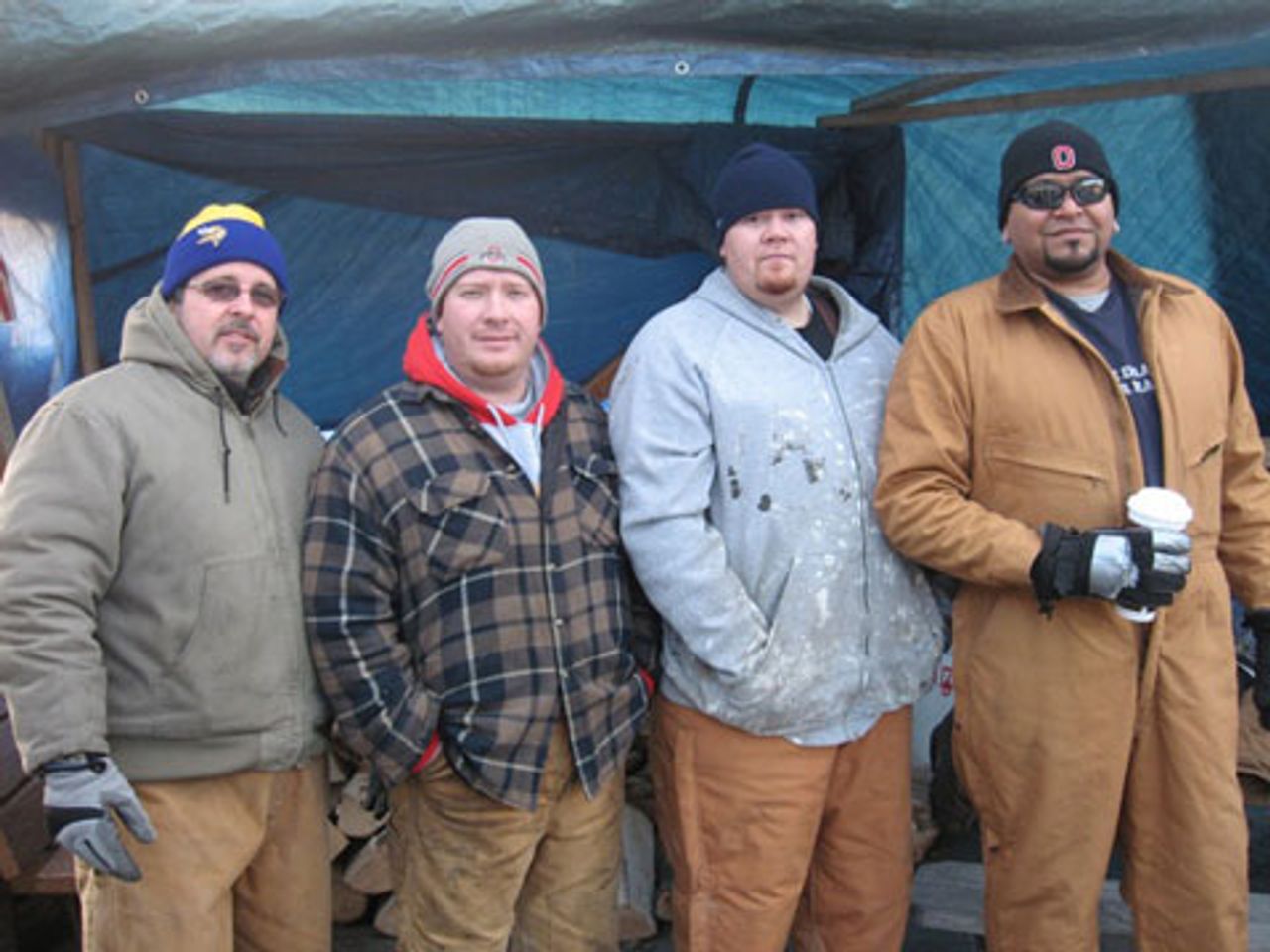 Findlay picket line with Mitch (left), Troy Parker (second from right) and Jerry Bermudez (right)
Findlay picket line with Mitch (left), Troy Parker (second from right) and Jerry Bermudez (right) Cooper Tire workers in Findlay, Ohio remain steadfast nearly six weeks after being locked out for opposing wage cuts of up to 40 percent. Despite the hardship of living without a paycheck since the lockout began on November 28, there is a growing recognition among the workers that they are involved in a critical battle against the destruction of living standards through the US and internationally.
“Who is going to free the slaves now?” asked Chuck Holman, a Cooper Tire worker with 20 years at the Findlay factory. “Because they want us all to work for slave wages. It started with Chrysler and GM, and they want to do it everywhere. You can’t purchase a new car or even one of the tires we make here on just $13 an hour.”
“All the money they are taking from us is going straight to profits,” Chuck added. “They say these cuts are needed to remain ‘competitive,’ but then they hand Roy Armes, the CEO, $4.7 million and a corporate jet too. He gets $18,000 in vacation expenses—that’s almost as much as a new-hire gets in wages for the whole year.
“As far as the government is concerned, they’re for the richest one percent too. America is starting to rise up. You could see it with the Occupy Wall Street protests. I don’t want to be rich, I just want to live decently.”
While workers on the picket lines are determined to defeat this attack, the isolation of the struggle by the United Steelworkers union (USW) has allowed Cooper Tire to escalate its campaign to starve workers into submission.
The state of Ohio finally started issuing unemployment checks just before Christmas, but workers are subsisting on no more than half their weekly earnings. At the same time, the company has until January 11 to challenge the payments. If successful, the locked out workers would be forced to pay the state back. Cooper is also cutting off health insurance for workers and their families by the end of the month.
For its part, the USW has aided and abetted the company. Although it controls a strike fund worth more than $150 million, the union has only provided workers a few weeks’ worth of $100 gift cards to buy groceries. “We’ve paid union dues all these years and what do we get—a gift card!” complained one senior worker. “You can’t use that to pay for electricity or rent.”
Another veteran worker added, “The local union says we have to go back to the USW International to ask for more assistance. We shouldn’t have to ask for anything—we’ve been paying into the union forever. You can’t imagine how many billions the USW must be sitting on in their banks.”
Under no compulsion to back away from its demands, Cooper management cancelled a negotiation session with a federal mediator set for January 12. There have been no talks since December 13.
Cooper has bused in 500 strikebreakers from throughout the US to continue production at the Ohio plant, while it has expanded production at its other US and international facilities to fill orders.
In the face of this attack, the USW has rejected any joint strike action with Cooper Tire workers at the company’s other unionized plant in Texarkana, Arkansas. This is despite an overwhelming strike vote by workers there, whose contract expires on January 20. In 2008, the USW accepted $30 million in wage and benefit concessions at the Texarkana plant, just as it did in Findlay.
“At this point, they just want to make people hurt,” Mitch said. “After our medical insurance runs out at the end of the month, they’ll refloat the same contract hoping people will take it. Between us and Texarkana, we account for 70 percent of production. If we hold together, how long would it be before they start to lose million dollar contracts? How long before they start to lose clients? Many of these jobs are skilled; you can’t just walk in and do them off the street.”
Far from conducting a struggle against the corporations, however, the USW is tied by a million threads to the corporations and their political backers. Earlier this week, USW officials hosted Senator Sherrod Brown at the union hall in Findlay, allowing him to posture as a friend of the workers. Last summer, the Democratic senator, who worked closely with the USW to impose tariffs on Chinese tires, hailed Cooper Tire executives for increasing employment in the state when they added 100 low-paying jobs.
“The American people should clean out Washington,” an older worker said. “It doesn’t matter what party they are, they side with the rich.” Another added, “We need a revolution. Kids making $13 an hour qualify for food stamps. What did we get for Christmas? They took away our Christmas pay! We had four holiday days, at $300 per day, and they took it!”
 Jerry Bermudez
Jerry Bermudez“The US is all about the almighty dollar,” Jerry Bermudez, a younger worker, added. “Us peons, we have nothing. I grew up in a family of migrant workers who had no health care, decent wages or sick days. They are turning everybody into migrant workers now.
“The banks are the first to take your car or your house if you don’t make payments. But Obama bailed them out right away—what about our bailout?”
Referring to the lockout by Caterpillar of 425 workers in London, Ontario, Jerry said, “They should stay strong. It’s about the dollar and greed all over the world. They are pitting American workers against Canadians. Even these scabs that come in here, they are so desperate that they are taking our jobs just to try to feed their families. You don’t have to go to China or Mexico anymore, the companies can get cheap labor right here.”
Several workers on the picket line have had experiences with plant closings after the unions said concessions would save their jobs. Some worked for auto parts suppliers Rockwell or Tower Automotive or American Standard, which shut its nearby Tiffin kitchen and bath fixtures factory in 2008, eliminating 200 jobs.
Troy Parker, a worker with two years at the plant, said, “It’s hard to find work around here. But I left a $15 an hour job to work twice as hard here for $13 an hour. The cost of everything is going up, and we’re being cut.” As other workers noted, these poverty wages had left new workers eligible to collect food stamps.
 John Smith
John SmithJohn Smith, a worker with eight years, said, “It’s only gotten worse since I came here. The first years they said they were concerned about safety, and now it’s all about production. Now they want to change the pay structure to make you work even harder to maintain your current level of pay. That is only going to increase accidents. I used to work for Tower Automotive, which filed for bankruptcy and shut the Upper Sandusky plant.
“America is falling apart. For the corporate executives $100 million is not enough—they have to have $300 million. And all the big money is behind the Democrats and Republicans. It’s impossible to run as an independent when it takes hundreds of millions to run for president. Maybe what is happening here is a wake-up call that will spur a political revolution in this country. Enough is enough.”
